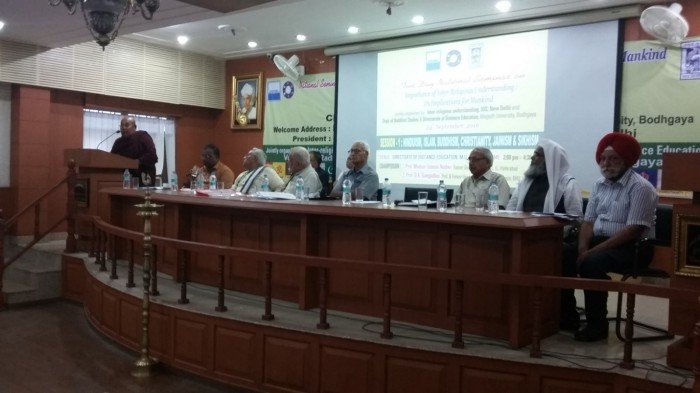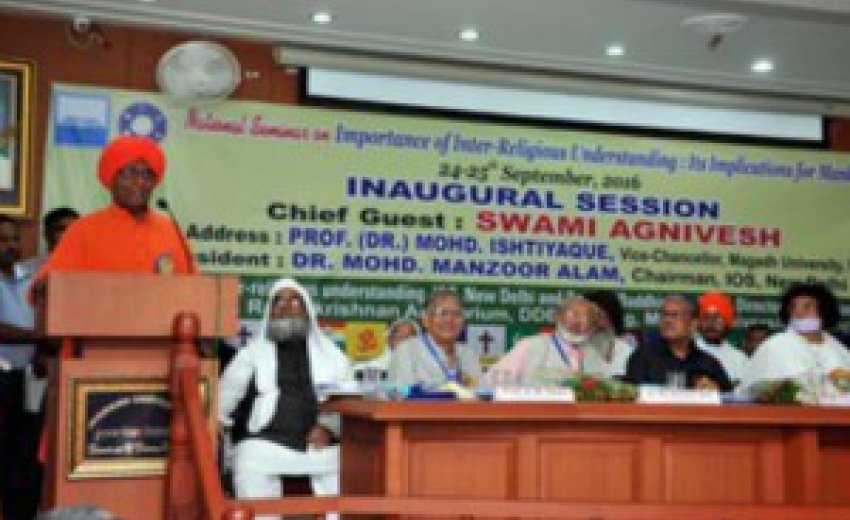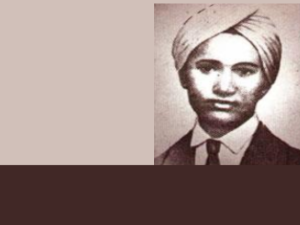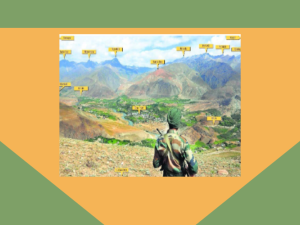Interfaith Meet at Gaya - Concepts Discussed
Prof Dalvinder Singh Grewal
Desh Bhagat University
A 'National Seminar On Importance of Inter-Religious Understanding: Its implications for mankind' was held on September 24- 25, 2016 at Magadh University Gaya, Bihar to assess, impress and propagate the importance of Inter-Religious Understanding and Its implications for mankind. The concept framed by the organizers was to sensitize and introduce legal aid programmes for strengthening democratic institutions and develop society's recourse for non-violent conflict resolution. In our present scenario, communalism has assumed a form of extreme religious chauvinism and antagonism towards the other religions and often is accompanied by exclusivist political mobilization. In the trouble torn world, where religious nationalism and communal politics has reigned supreme, interreligious dialogue has become matter of paramount concern to all the people who are interested in human dignity and rights. After the environment around has been vitiated by conflicts and hatred, mostly we need to give the social and psychological rehabilitation to the people as these things have been made invisible by conflict especially orphans, refugees and widows.
Secularism in South Asia refers not just to the separation of religion and state, but also to the constitutionally mandated public embrace of a plural religious culture. This entails the guarantee of rights of groups to organize, educate, observe customs, and propagate their faith. This all implies that we need to stand for equal respect to all religions and should oppose to the cynical manipulation of faith in the pursuit of power. Both the minority and majority communalism are a curse for communal harmony.
To maintain peace in our society despite divergent denominational identities is the main question in the presently chaotic times for which various kinds of dialogical engagements are needed. The dialogue that promotes 'engaged pluralism' is one that seeks understanding and accepts difference. Dianna Eck says: "The encounter in a pluralistic society is not premised on achieving agreement, but achieving relationship."
If we understand this point that difference is a part of nature and the art of difference managemet is only possible through meaningful and positive interfaith dialogue, and thus we can seek peaceful solutions to controversial matters in spite of differences. By giving people respect and honour these differences can become blessings. The result will be dialogue, sharing of views -that will result in intellectual development, which is a boon for everyone concerned.

This is a divine plan that differences will always remain there therefore we do not need to artificially seek to eliminate or overcome differences, but the solution is in embracing these differences. We need to follow one religion but respect all .This can become the formula of co- existence, in a multi cultural, multi religious society because there is no other feasible formula. We need to bring together people of good will in the common cause of fighting injustice and lifting up the poor. Religion should make us to work for collective salvation and not mainly to concentrate on personal salvation. As a famous Swami says: "The Task of the spiritually enlightened is not to promote one particular religion: much less to pit one religion against another" but in "identifying the good and the common factors that exist within all religions".
We need to create a world where religions interact in an integrative model as against the present conflict oriented competitive model.
We sometimes lose sight of the many positive forms of dialogue between communities especially Hindus, Muslims and Christians because of the high profile and well publicized conflicts of the past and present. Though the term "inter-religious dialogue "is a modern convention, but the earlier records show that different communities in India have encountered enormous curiosity and lively inter change between religions in matters of technology, arts, and sciences as well as spirituality. From the investigations of al-Biruni to the translation projects in the Mughal period, to the Bhakti and Sufi devotional moments and to the daily pious practice at countless shared sites, to the social and political activism of human rights advocates, inter religious dialogue between different communities had been our rich though complex legacy which is still going on in different known and unknown forms.
Interreligious dialogue in contemporary society is initiated to create better relationships between people belonging to different religions by bringing them together in dialogue: it thus aims to establish peace and harmony in a society which has been devastated by conflicts between religions. There are several important aspects in dialogue in this regard.
The uncritical reception and interpretation of 'religious conflicts' or 'conflicts in the name of religions', and the failure to appreciate that religious conflicts are often more than 'religious' conflicts and, often, not even 'religious' conflicts at all, 'religion' having become a mere useful peg on which to hang the violence.
The elite nature of dialogue in which grass root people (and their life and issues) either become silent objects of discussions or are passive listeners to whom the 'knowledge' of dialogue should be passed on. Accordingly, the elite nature of dialogue has ignored the actual living relationships among grass root people - who have different religious identities as well as multiple community identities - and has put restrictions on dialogue.
To be more effective in contemporary India, dialogue needs re-vision itself making use of the insights available from how grass root people understand religions, use religious and other identities, perceive 'religious' conflicts, and relate with their neighbours from other communities including religions in spite of conflicts. Especially the multiple identities exercised in grass root living - both crossing single fixed religious identities as well as crossing religious identities - can help those involved in dialogue to enhance their thinking and activities for constructing better models in their efforts for creating peace and harmony between people in the context of conflicts and violence.
.But in the contemporary period, interreligious dialogue is not simply any conversation between people with different religious identities. Rather it is presented as an important step in understanding one's own religion and one's neighbours' religions, and thus a step towards better understanding and relationships between people of different religions.
The presupposition is that dialogue helps to eliminate religious conflicts and tensions because religions have the potential to further the cause of world peace, if the process is explicated through dialogue. Dialogue is an approach in which positive attitudes and openness to other religions are implied, the view being that such positive attitudes between members of different religions are necessary to create better relationships among humans in society. This positive attitude varies from showing mutual openness and mutual sharing among the participants while keeping the distinctive features of their respective religions, or affirming and acknowledging the differences between religions while emphasizing the unity of aim or intention of all religions, even though the latter is sometimes criticised in dialogue circles. Such dialogue is not just a practical activity, but it has become a sort of 'ideal stance' which is different from the 'actualities of dialogue'. In this approach, the dialogue promoters write about it or articulate it purely in terms of theory and principle. In formal dialogue, it is more than an ordinary two-way conversation for it refers to particular types of conversation, or conversation with particular attitudes. Thus the term dialogue has been conceptualised, esentialised and imbued with ideas which refer to meanings beyond conversation, such as positive attitudes and tolerant approaches.
One common notion in dialogue is that the level of religious misunderstanding is high especially among ordinary people or people at the grassroots and because of this they are vulnerable to being involved in religious conflicts. Therefore, it is claimed, these people have to be educated about dialogue to ensure the maintenance of communal harmony in the contemporary Indian context
The assumption that 'religion' or 'religions' contribute to violence, and the uncritical acceptance of this notion in dialogue has, in fact, set many limitations for dialogue. It is often overlooked that what is claimed as 'religious violence' often stems from socio-economic and personal struggles of people, and from the political intervention which plays with the religious identities of people in order to receive votes and to achieve political power. For instance, in India, what is termed 'religious conflicts', has been, at the roots, mostly a social issue involving caste domination and oppression, or economic struggles between people or people's groups, or political manipulations for power or even personal problems between people.
Questions such as how they evolve into 'religious conflicts' and how and why they are projected as such, and how these economic, political and social realities are overlooked in dialogue need attention.
In other words we can say this sympathetic study of religions other than one's own is an attitude of the modern mind induced by the recognition of the fact that plurality of faiths is not something contingent but rooted in the human situation and so if different religious communities are to live together in peace and amity, each must while believing in the truth of its own faith, try to find and assimilate truth in the faith of other communities. Though this understanding is very difficult to achieve because every religion is a unique entity with its history and there has not been the one uniform line of development, but it should not make us hopeless about the final end of the process of inter religious understanding because still at the level of mystical experience, the diversity of religions is resolved into unity.
An eclectic approach can be developed to solve religious conflicts between the various traditions because finally it is religion which holds before man's imagination the vision and hope transcending all the limitations imposed by life temporal. Because there are two dimensions of religion, it has produced great saints and sages of highest caliber, and second is the role of organized religious communities which have fallen short of the ideal. Because religions have fought and quarreled, really for economic and political gains, but religion has been exploited for this purpose. Some political groups have used these conflicts to stress not only irrelevance of religion but even to denounce religious values .But how religion can win the battle against skepticism is possible only if thoughtful people belonging to various religions put up a united front.

Also, India had Sufi and Bhakti traditions in Islam and Hinduism respectively. Both Sufism and Bhakti traditions were based on respect for different religions. The poorer and lower caste Hindus and Muslims were greatly influenced by these traditions. The Sufi and Bhakti saints were highly tolerant and open to the truth in other faiths. They never adopted sectarian attitudes and were never involved in power struggles. They kept away from power structures. Muslim mystic thought in many ways. Shah Niaz Ahmad of Bareilly thus declared the 'Dialogue of life' from the perspective of daily coexistence, as the communities have engaged in this type of dialogue in one way or the other is the need of the hour. Though we cannot over look the value of formal dialogue between officials and elite but now scholars should pay attention to the "dialogue from below", just as we look to theology from below and so on.'
Can religions be put into single unified systems and differentiated from each other? Why are conflicts between religions often spoken about, and uncritically accepted in the dialogue circles? If there are many causes for conflicts why is religion claimed as the prime cause? What are the different ways people at the grassroots understand and perceive relationships between religions and how do they live their everyday life in such contexts, and how are these different from elite conceptions of religion and dialogue? Theoretically, the discussion of the limitations of dialogue in the present context may be started with observing the ambiguities in dialogue.
We need to inform public about religious intolerance, violence, human rights violations, caste, and woman rights.
Inter faith dialogue should be coupled with justice and we need to organize seminars training programmes for youth and dialogue events. And make possible the interaction of prominent intellectuals and activists of variety of religious backgrounds and perspectives.





